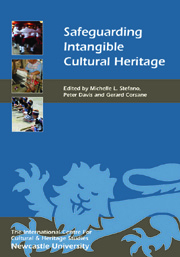Book contents
- Frontmatter
- Contents
- List of Illustrations
- Acknowledgments
- Touching the Intangible: An Introduction
- NEGOTIATING AND VALUING THE INTANGIBLE
- APPLYING THE INTANGIBLE CULTURAL HERITAGE CONCEPT
- 8 Reflections on the Implementation of the UNESCO 2003 Convention for the Safeguarding of Intangible Cultural Heritage in France
- 9 Government and Intangible Heritage in Australia
- 10 Proud to be Dutch? Intangible Heritage and National Identity in the Netherlands
- 11 Intangible Cultural Heritage in Wales
- 12 Conversation Piece: Intangible Cultural Heritage in Botswana
- 13 The UNESCO Convention for the Safeguarding of Intangible Cultural Heritage and its Implications for Sustaining Culture in Nova Scotia
- ON THE GROUND: SAFEGUARDING THE INTANGIBLE
- List of Contributors
- Index
9 - Government and Intangible Heritage in Australia
from APPLYING THE INTANGIBLE CULTURAL HERITAGE CONCEPT
Published online by Cambridge University Press: 05 February 2013
- Frontmatter
- Contents
- List of Illustrations
- Acknowledgments
- Touching the Intangible: An Introduction
- NEGOTIATING AND VALUING THE INTANGIBLE
- APPLYING THE INTANGIBLE CULTURAL HERITAGE CONCEPT
- 8 Reflections on the Implementation of the UNESCO 2003 Convention for the Safeguarding of Intangible Cultural Heritage in France
- 9 Government and Intangible Heritage in Australia
- 10 Proud to be Dutch? Intangible Heritage and National Identity in the Netherlands
- 11 Intangible Cultural Heritage in Wales
- 12 Conversation Piece: Intangible Cultural Heritage in Botswana
- 13 The UNESCO Convention for the Safeguarding of Intangible Cultural Heritage and its Implications for Sustaining Culture in Nova Scotia
- ON THE GROUND: SAFEGUARDING THE INTANGIBLE
- List of Contributors
- Index
Summary
Australia's response to ratifying the UNESCO Convention for the Safeguarding of the Intangible Cultural Heritage has been cautious. Its original refusal to ratify the Convention appeared to soften with a change of national government in 2007, but in 2012 there is still no sign that Australia will become a party to the Convention.
There has been a closed Federal government enquiry into ratification but no information relating to it has been publicly released (Cassidy 2010). The Federal focus is on issues relating to Australia's Indigenous populations and not the many immigrant community cultures whose heritage could also be covered under the Convention. Several organisations which made submissions to the preliminary enquiry have posted them on the internet, and these do discuss the Convention's importance to immigrant communities as well as Indigenous Australia. Views differ on whether Australia should ratify the Convention. This chapter summarises the processes undertaken so far and the limited publicly available views of parties who have expressed interest in it. It also outlines the range of connected policies and programmes operating within Australia.
AUSTRALIAN POLITICAL CONTEXT
Australia has a Federal system of government, in which the Federal Constitution defines the powers of the national government (also called the Australian, Commonwealth or Federal government). State governments hold the residual powers. Section 51 (xxix) of the Commonwealth of Australia Constitution Act (Attorney-General's Department 2003) gives the national parliament power to make laws with respect to external affairs, and under this power the Australian government ratifies international conventions.
- Type
- Chapter
- Information
- Safeguarding Intangible Cultural Heritage , pp. 111 - 124Publisher: Boydell & BrewerPrint publication year: 2012



